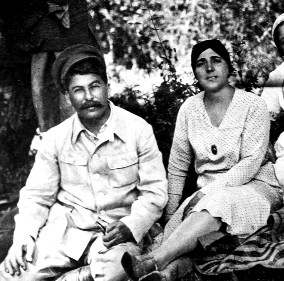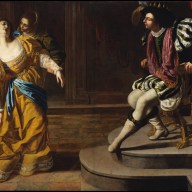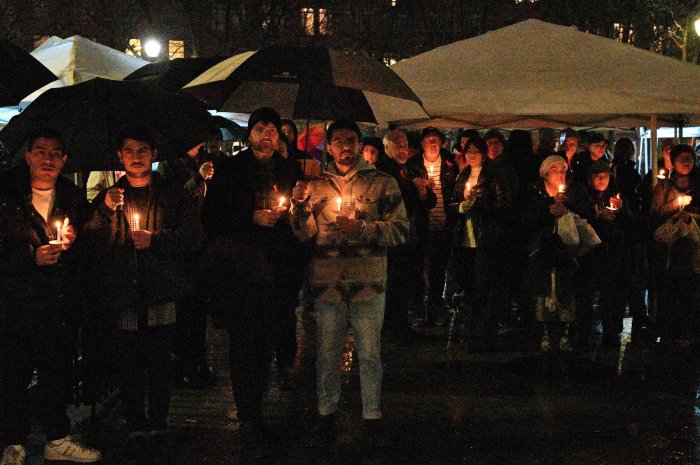By Jerry Tallmer
She was 16, he was 39.
That’s not so unusual, but the 39-year-old in this case was the a rough-hewn Georgian from Tiflis named Iosif Vissanonovich Dzhugashvili, back from four years exile in Siberia just in time for the Revolution – though on the great dangerous day itself, November 7, 1917 (old calendar), he was, they say, nowhere to be found.
Be that as it may, during the next three and a half decades this gentleman, Joseph Stalin, who IN 1919, having lost an earlier wife to typhus, became the husband of 16-year-old Nadezhda Alliluyeva, would directly or indirectly be responsible for the deaths of tens of millions of human beings.
Was one of those millions she herself, that onetime child bride? And had he raped her, during a train ride, at night, before he married her? And was he in fact not only her husband but, a la John Huston in Roman Polanski’s “Chinatown,” her father?
“The devil himself knows whose daughter you are, maybe mine,” he had bellowed at her when the fury was upon him. At that, Stalin might not improbably have been one of the many revolutionaries whom Nadezhda’s mother, strong-willed, free-thinking Olga Federenko, took to bed now and again. We know that Olga thought her daughter too young and Stalin too old for them to marry.
Natasha Alliluyeva probably didn’t say anything. Her prettiness, according to photographs, was of the somewhat bovine sort, and on top of that, all during her 14 years with Stalin – i.e., the 14 remaining years of her life — she’d been “forcing herself to be dull.” So we are told. She’d also had 10 abortions (plus two children, Vasili and Svetlana).
We are told these and many other fascinating things – “truths, lies, contradictions” – in a 104-minute documentary film called “Stalin’s Wife” that opens April 29 for a week at Greenwich Village’s own Quad Theater on 13th Street. It was made by a man named Slava Tsukerman who lives one block north, on 14th Street. Has lived there, with his wife and co-producer, Nina V. Kerova, for 20 years.
“You’ll recognize him,” press rep Samantha Dean had said. “He’s short and round and, well, he looks like a Russian.” And so he does. A short, rotund Russian. Jovial. Jewish. Round pink face. Round head. Cannonball crown. Fringe of greying back hair behind the ears, like a lamp shade. Intelligence bubbling from the eyes, like champagne.
Now about those 10 abortions –
“I’ve seen the documents!” Tsukerman exclaims. “At the Russian National Archives! Held them in my hand! In Russia,” he said with fewer exclamation marks, “many women have more than 10 abortions.”
Slava (Vladislav) Tsukerman, who got out of Russia in 1973, has only vestigial, fragmented memories – small-boy memories – of growing up under Stalin.
“He was like a god. When I was 6 or 7 years old, I remember standing with a neighbor boy on a fifth-floor balcony. He said to me: ‘If Stalin ordered it, would you jump?’ And I said yes.”
The film opens with the profile, in stone, of a beautiful woman. It is the flattering, idealized carving over the tomb of Nadezhda Alliluyeva Stalin in Moscow’s Novodevichy Monastery cemetery.
“Her burial there is very unusual,” said Tsukerman. “Most Communist leaders are buried in the Kremlin walls. She lies surrounded by famous artists and writers. There were legends that Stalin would come at night and sit there. I think I remember that.”
The film paints a picture of the hell on earth in which Nadezhda lived with a husband who slept where he wanted to, fathered various illegitimate children, drove his son Jakov (from the first marriage) to attempted suicide and then sneered at him for botching the job (“Here’s the way you shoot yourself!”), abused and insulted the pain-wracked Nadezhda over the years, threw cigarette butts at her, raved drunkenly at her.
Finally, in a phrase Tsukerman has borrowed from Tolstoy, “The screw had screwed out.” Her personality was all used up. On or about November 7, 1932, the 15th anniversary of the Revolutionary, Nadezhda Alliluveya went upstairs to bed, and when the housekeeper came to wake her up in the morning, she found the lady of the house dead, shot through the right temple, a pistol lying on the bed beside her.
But Nadezhsda Alliluveya was left-handed. Try shooting yourself through the right temple with your left hand. And there were no powder marks on her temple. And she’d left a letter: There is no getting away from him, it said. The doctor who did the autopsy reported she was shot from a distance of 4 meters. That doctor was subsequently executed.
So what does Slava Tsukerman think? Was she shoved or did she jump? Did she commit suicide or was she murdered?
“Everybody asks me this question,” he said. “When I started on this film, I didn’t believe in any of the legends. I believed her suicide was perfectly logical, made perfect sense. Lots of great Russian poets and other people were committing suicide around that time.
“But! … but when I started to study the whole thing, I found too many documents [leading to the conclusion] that he killed her.
“Was she Stalin’s daughter? Even that is like an ancient Greek fantasy, or tragedy. Oedipus Rex. Even that is very probable. And these days it is quite easy to find out. Yes, through DNA. All you have to do is dig Nadezhda up from the grave.
“I’m not afraid to use a strong word about the Russians,” the filmmaker said. “They are a very pagan people. Look how many changes there have been of the men in power – and all of them afraid to take Lenin out of that tomb …”
Slava Tsukerman already made a deep imprint on Greenwich Villagers and filmgoers in general with his “Liquid Sky,” characterized by him as “a movie about punks, rock-and-roll, and sex” that “was a huge event at the Waverly Theater” in 1983 and has playing here and there ever since.
“A lot of people say it was the most weird movie ever made – realistic and Surrealistic at the same time. Nobody expected me to go back to documentaries. I didn’t expect it myself.”
But then, one day a couple of years ago, he got a call from a producer friend of long standing, a woman in Moscow named Myra Todorovsky.
“She told me there was a book out in Russia about Stalin’s wife, a book of fiction.” What now was needed was fact. “I called an American producer with whom I’d worked, and so we made the movie. This project took me longer than anything else in my life. Usually I’m very fast. This one took a year and a half.”
The son of a doctor (Stalin was the son of an incompetent, abusive cobbler), Tsukerman was one of the very few Jews admitted to Russia’s National Film School, on the basis of a prize-winning 10-minute short, “I Believe in Spring,” of “small love between a boy and girl.”
Graduating with honors in four years instead of the usual five, he was – in Russia, “where everything was regulated” – dispatched to a studio that made scientific educational films, “a strange genre, impossible to put into ordinary terms.”
He became, he says, “very famous in the Russian newspapers, even Pravda, not because I was young and talented but because of my name, Tsukerman, which was like a bomb” to anti-Semites.
“To pursue my career, I needed to do two things: Change my name, and become a member of the Communist Party. I never did it – neither one.”
In 1973 he emigrated to Israel. “There was some chance you leave, some chance you stay forever. It was a game. I was lucky.”
In Israel, his new boss said: “You know nothing about Israeli life and everything about Russian life. So go make a film about the Russian church in Jerusalem.” Which is what Slava did, and it won a lot of prizes. “He was right.”
In 1976 Slava made it to the United States, and soon thereafter to Greenwich Village. But certain things do not change. “This film provokes on the Internet so many letters from Russia saying things like: ‘We don’t want to discuss anything that a shit with a name like Tsukerman has to say.”
What Tsukerman has to say is what the statistics have to say: Between 1935 and 1941, following the death of Nadezhda Alliluyeva, 19 million citizens of the Soviet Union were arrested, 7 million of them died. Maybe, Slava Tsukerman theorizes, if Joseph Stalin had only had a softer, more compliant, more mature, less self-willed dullard of a wife …
Who knows?




































